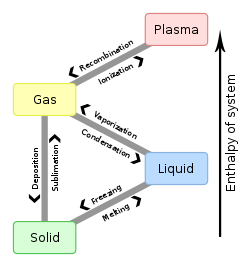ବ୍ୟବହାରକାରୀ:Snip1/ପଦାର୍ଥର ଅବସ୍ଥା ଗୁଡ଼ିକର ତାଲିକା
ଦେଖଣା
(ବ୍ୟବହାରକାରୀ:ଶିତିକଣ୍ଠ ଦାଶ/ପଦାର୍ଥର ଅବସ୍ଥା ଗୁଡ଼ିକର ତାଲିକାରୁ ଲେଉଟି ଆସିଛି)
Classically, states of matter are distinguished by changes in specific heat capacity, pressure and temperature. States are distinguished by a discontinuity in one of those properties: for example, raising the temperature of ice produces a clear discontinuity at 0 °C as energy goes into phase transition, instead of temperature increase.
In the 20th century, increased understanding of the more exotic properties of matter has resulted in many additional states of matter, none of which are observed in normal conditions.
The list is ordered roughly in terms of increasing energy density.
ନିମ୍ନ-ଶକ୍ତି ଅବସ୍ଥା
[ସମ୍ପାଦନା]ପାରମ୍ପରିକ ଅବସ୍ଥା
[ସମ୍ପାଦନା]- କଠିନ: A solid holds a rigid shape without a container.
- Amorphous solid: A solid in which there is no long-range order of the positions of the atoms.
- Crystalline solid: A solid in which the constituent atoms, molecules, or ions are packed in a regularly ordered, repeating pattern.
- Plastic crystal: A molecular solid with long-range positional order but with constituent molecules retaining rotational freedom.
- ତରଳ: A mostly non-compressible fluid. Able to conform to the shape of its container but retaining a (nearly) constant volume independent of pressure.
- Liquid crystal: Properties intermediate between liquids and crystals. Generally, able to flow like a liquid but exhibiting long-range order.
- Disordered Hyperuniformity It behaves like a crystal and a liquid. The density of particles over large distances is the same like a crystal. It is also a liquid in the sense that at smaller distances, the particles display same physical properties in all directions.
- ଗ୍ୟାସୀୟ: A compressible fluid. Not only will a gas conform to the shape of its container but it will also expand to fill the container.
- ପ୍ଲାଜମା: free charged particles, usually in equal numbers, such as ions and electrons. Unlike gases, plasmas may self-generate magnetic fields and electric currents, and respond strongly and collectively to electromagnetic forces.
ଆଧୁନିକ ଅବସ୍ଥା
[ସମ୍ପାଦନା]- Degenerate matter: matter under very high pressure, supported by the Pauli exclusion principle.
- Electron-degenerate matter: found inside white dwarf stars. Electrons remain bound to atoms but are able to transfer to adjacent atoms.
- Neutron-degenerate matter: found in neutron stars. Vast gravitational pressure compresses atoms so strongly that the electrons are forced to combine with protons via inverse beta-decay, resulting in a superdense conglomeration of neutrons. (Normally free neutrons outside an atomic nucleus will decay with a half life of just under 15 minutes, but in a neutron star, as in the nucleus of an atom, other effects stabilize the neutrons.)
- Strange matter: A type of quark matter that may exist inside some neutron stars close to the Tolman–Oppenheimer–Volkoff limit (approximately 2–3 solar masses). May be stable at lower energy states once formed.
- Photonic matter: Inside a quantum nonlinear medium, photons can behave as if they had mass, and can interact with each other, forming photonic "molecules".
- Quantum Hall state: A state that gives rise to quantized Hall voltage measured in the direction perpendicular to the current flow.
- Quantum spin Hall state: a theoretical phase that may pave the way for the development of electronic devices that dissipate less energy and generate less heat. This is a derivation of the quantum Hall state of matter.
- Bose–Einstein condensate: a phase in which a large number of bosons all inhabit the same quantum state, in effect becoming one single wave/particle.
- Fermionic condensate: Similar to the Bose–Einstein condensate but composed of fermions. The Pauli exclusion principle prevents fermions from entering the same quantum state, but a pair of fermions can behave as a boson, and multiple such pairs can then enter the same quantum state without restriction.
- Superfluid: A phase achieved by a few cryogenic liquids at extreme temperature where they become able to flow without friction. A superfluid can flow up the side of an open container and down the outside. Placing a superfluid in a spinning container will result in quantized vortices.
- Supersolid: similar to a superfluid, a supersolid is able to move without friction but retains a rigid shape.
- Quantum spin liquid: A disordered state in a system of interacting quantum spins which preserves its disorder to very low temperatures, unlike other disordered states.
- String-net liquid: Atoms in this state have apparently unstable arrangement, like a liquid, but are still consistent in overall pattern, like a solid.
- Supercritical fluid: At sufficiently high temperatures and pressures the distinction between liquid and gas disappears.
ଉଚ୍ଚ-ଶକ୍ତି ଅବସ୍ଥା
[ସମ୍ପାଦନା]- Quark–gluon plasma: A phase in which quarks become free and able to move independently (rather than being perpetually bound into particles) in a sea of gluons (subatomic particles that transmit the strong force that binds quarks together). May be briefly attainable in particle accelerators.
- Weakly symmetric matter: for up to 10−12 seconds after the Big Bang the strong, weak and electromagnetic forces were unified.
- Strongly symmetric matter: for up to 10−36 seconds after the Big Bang the energy density of the universe was so high that the four forces of nature — strong, weak, electromagnetic, and gravitational — are thought to have been unified into one single force. As the universe expanded, the temperature and density dropped and the gravitational force separated, a process called symmetry breaking.

